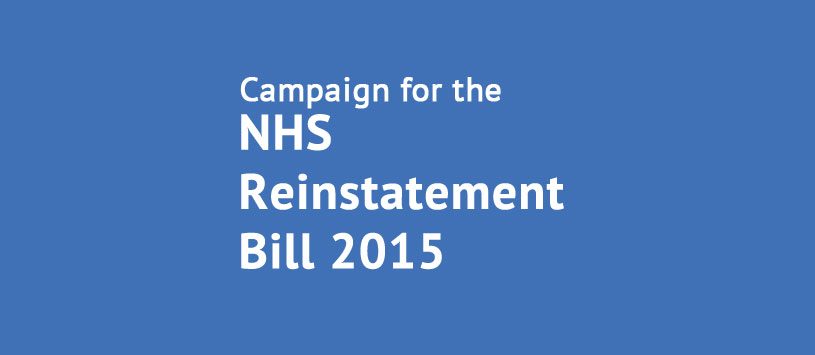Press release
Tuesday 10 March
Here is the tool now start the job: NHS Reinstatement Bill before Parliament
Parliament will be handed a way to save the NHS from massive break-up and eventual collapse tomorrow (11 March) as the NHS Reinstatement Bill 2015 is laid before it by Green Party MP Caroline Lucas, with cross-party support from 11 more MPs. And to mark the occasion, NHS campaigning groups will be assembling outside Parliament on College Green, Westminster, at 11.30 am. Noting what could be the start of restoring the NHS back to its founding principles, and stopping the process of breaking apart and handing over of services to private healthcare organisations – which current legislation has guaranteed.
The NHS Reinstatement Bill, drafted by Professor Allyson Pollock and barrister Peter Roderick, is unique amongst proposals for changes to the law governing the NHS in having no party affiliation: it is non-partisan. It frames a clear mechanism to protect the NHS against the damage of privatisation, in overturning key aspects of the Health and Social Care Act 2012 and earlier legislation that set the NHS in England on the road to fragmentation – often without public consultation, and nearly always without their full awareness.
Far from being yet another ‘top-down, centralised, re-structuring’, crucially it hands responsibility for provision of service back to the Secretary of State for Health, something the HSCA severed – thereby effectively uncoupling ultimate responsibility for the NHS from Parliament. It also spells out how, if the NHS is to be saved, it must:
- Reinstate the government’s legal duty to provide key NHS services in England.
- Abolish market structures like foundation trusts [1].
- Abolish competition and contracts [2].
- Centralise PFI debt to protect individual trusts from its impact.
- Stop immigration health charges [3].
- Stop treaties like the Transatlantic Trade and Investment Partnership (TTIP) [4]without Parliament’s approval if they cover the NHS.
- Establish area Health Boards from the bottom up.
- Re-establish Community Health Councils for public accountability.
- Require national terms and conditions under the NHS Staff Council and Agenda for Change system [5].
MP Caroline Lucas said:
‘Our NHS is being dismantled piece by piece. A fragmented, market-based structure isn’t the “national” service that so many people fought for so courageously.
‘It mustn’t be reduced to a set of transactions, contracts and bidding wars that hollow it into little more than a logo – and waste resources that could be spent on front-line patient care.’
Professor Allyson Pollock:
‘One of the things we want to ensure is that there is no horse-trading when it comes to the reinstatement of the NHS. Without the restoration of the duty to provide core-listed services, which the Health and Social Care Act removed from the Secretary of State, we will continue to see the NHS wither away.
‘We will then see a race to the bottom: the blurring of health and social care, more introduction of charges, and marketization.
‘So that’s why we’ve been working so hard on the NHS Reinstatement Bill. We’re been trying to get cross-party support and we have it.
‘What we need people to do is to get involved in the campaign to get prospective parliamentary candidates to sign up to the legislation so that if there’s a hung parliament and if deals are being done they know that the NHS cannot be part of the horse-trading, it is absolutely sacrosanct. I hope everyone will support the Reinstatement Bill and what we are trying to do around it.’
The Bill has support from across the political spectrum. The MPs who have signed up to it so far are:
Caroline Lucas
Andrew George
John Pugh
Michael Meacher
Chris Williamson
Roger Godsiff
Kelvin Hopkins
Jeremy Corbyn
John McDonnell
Eilidh Whiteford
Hywell Williams
Katy Clark
(Parliamentary procedure limits the number of MPs who can support tabling a Bill before Parliament to 12.)
Editors’ Notes
The Campaign for the NHS Reinstatement Bill is a non-partisan campaign and has a wide range of support across the political spectrum (http://www.nhsbill2015.org/our-supporters/ ). It encourages the public to contact prospective parliamentary candidates in their constituency, determine their views on the Reinstatement Bill, and gain their support for it wherever possible:
The Campaign’s press officer is Alan Taman:
07870 757 309
http://www.nhsbill2015.org/press-contact
[1] The belief that ‘competition is always best’ does not work when applied to healthcare. A comprehensive and universal health service is best funded by public donation, which has been shown to be far more efficient overall than private-insurance healthcare models. [Lister, J. (2013) Health Policy Reform: global health versus private profit. Libri: Faringdon. [2] The NHS has always used private firms, partnerships and individual traders to provide services it could not easily or as cost-effectively provide for itself, eg some legal services and construction of or repair to NHS buildings. What the NHS Reinstatement Bill does is end the current obligation on NHS services to use tendering to determine which organisation delivers front-line healthcare: this is pro-privatisation engineering and is an ongoing threat to the comprehensiveness of NHS care. [3] The Immigration Act proposes to discriminate against immigrants by charging them for NHS treatment. [4] The TTIP, if enacted as it stands currently, would make it very difficult for future governments to reverse the provision of healthcare by private organisations if they could show this would prove commercially damaging to them [http://en.wikipedia.org/wiki/Transatlantic_Trade_and_Investment_Partnership ]. [5] The Bill would ensure that any handover of employment for NHS staff from NHS FTs, CCGs and NHS trusts to the new NHS bodies was conducted with the full participation of Trade Unions and would require the Secretary of State for Health to make regulations setting out the terms and conditions of transfer.
